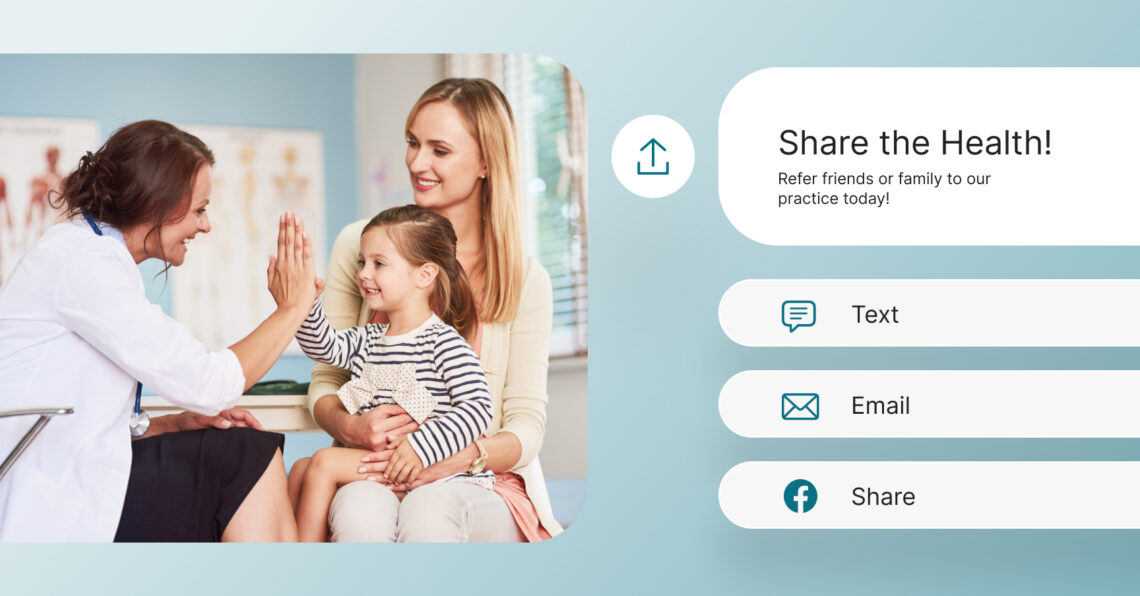Healthcare referral management depends on clear ownership, real-time referral status tracking, and follow-ups, but that’s where many teams struggle.
Summary:
A healthcare referral breaks down when ownership is unclear. Referrals sit unassigned, follow-ups are delayed, and information moves slowly between systems. As a result, staff spend time checking inboxes, portals, and tools to understand referral status, while patients wait without updates.
As healthcare organizations grow, referrals become harder to track and even harder to manage consistently. This is where an effective healthcare referral management brings order to that chaos. It centralizes referral visibility, assigns accountability, and keeps referrals moving from start to finish without constant manual intervention.
In this guide, we cover the seven signs of effective healthcare referral management and what to look for when improving referral workflows.
Table of contents
- What is healthcare referral management?
- 7 signs of an effective healthcare referral management
- What are the key aspects of healthcare referral management
- What are the benefits of adopting a healthcare referral management system
- What are the major differences between traditional and modern healthcare referral management software
- What are the benefits of having healthcare referral management software?
- Why you should use Birdeye Referrals as your healthcare referral management software
- FAQs on healthcare referral management
- Patient-centered care starts with Birdeye’s healthcare referral management
What is healthcare referral management?
Healthcare referral management is the process of tracking, coordinating, and managing patient referrals from one provider to another, most often from a primary care provider to a specialist, while ensuring timely follow-ups and continuity of care.
Referral management connects patients, referring providers, and receiving providers through clear workflows. It involves sharing the right clinical information, scheduling appointments, monitoring referral status, and confirming outcomes once care is delivered.
When healthcare referral management works well, patients experience fewer delays, providers have visibility into referral progress, and care teams avoid unnecessary manual follow-ups. When it doesn’t, referrals stall, patients disengage, and organizations lose insight into what happens after a referral is made.
The 2025 Kyruus Health Patient Access Benchmark Report found that nearly 30% of specialist referrals result in patient leakage or incomplete follow-through, highlighting the financial and continuity risks when referral processes lack visibility and ownership.
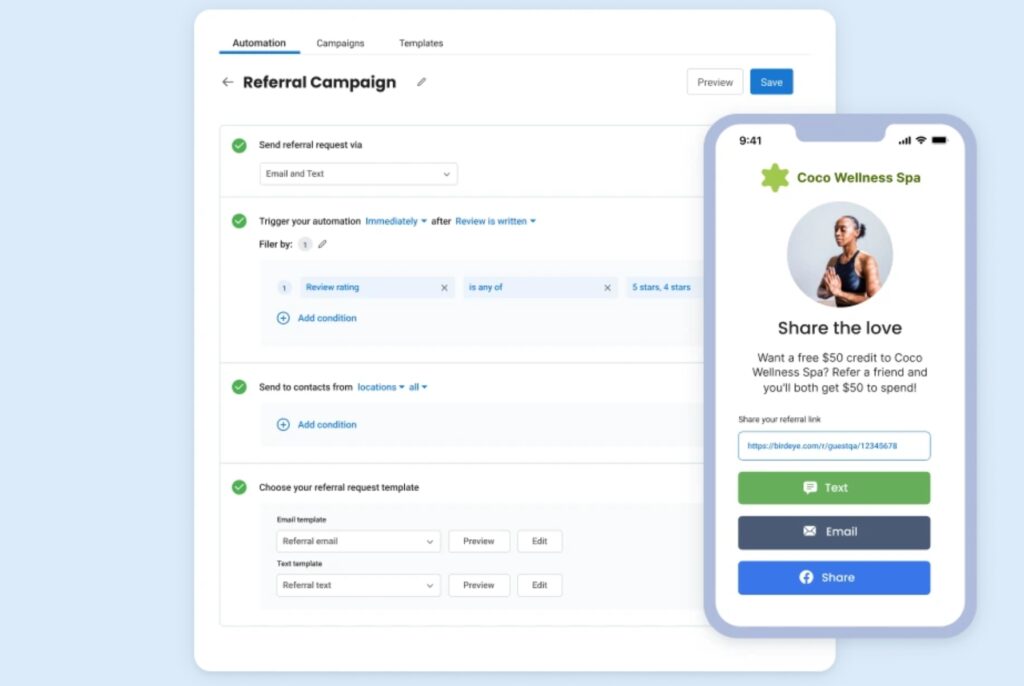
7 signs of an effective healthcare referral management
Effective referral management can be a game-changer for practices seeking to attract more patients and grow their business. With the right referral management software, healthcare providers can streamline their processes, boost engagement, and ultimately generate more healthcare leads.
Here are seven signs that your healthcare referral management system is working effectively:
1. Referral campaigns scale easily without added effort
2. Time is saved using templates
3. Referral incentives boost response rates
4. Referrals are collected across multiple channels
5. Referral leads are engaged and converted
6. Referral success is measured accurately
7. Referral workflows integrate seamlessly with your favorite apps
Let’s explore these in detail:
Sign 1: Referral campaigns scale easily without added effort
An effective referral management platform empowers you to run campaigns at scale, reaching a wider audience and maximizing your lead generation potential. By automating key processes and leveraging advanced segmentation capabilities, you can efficiently target specific demographics, ensuring your campaigns resonate with the right audience and drive better results.
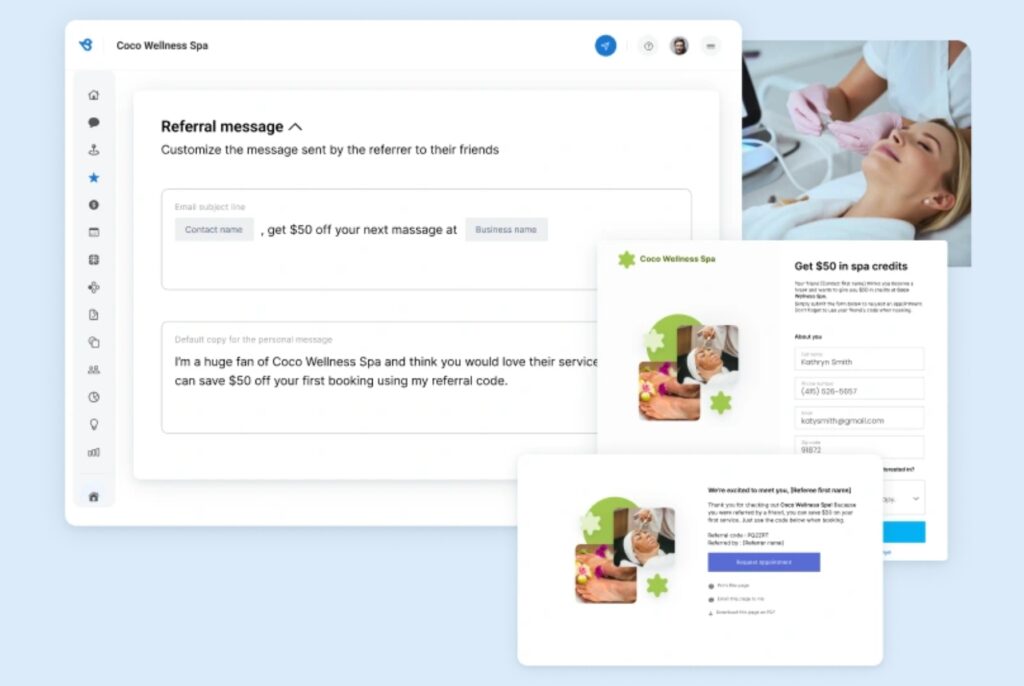
Sign 2: Time is saved using templates
In the healthcare industry, time is of the essence. An effective referral management system understands this, offering customizable templates that streamline the creation of referral campaigns. These templates help you quickly craft compelling messaging and branding, freeing up valuable time for your core healthcare operations.
Sign 3. Referral incentives boost response rates
Encouraging referrals is a great way to increase engagement and get more patients. A good referral management platform lets you easily add incentives like discounts or referral rewards programs to your campaigns. By motivating your current patients to refer their friends and family, you can bring in a steady flow of new, qualified leads.

Sign 4. Referrals are collected across multiple channels
Patients interact with healthcare providers through various channels, including websites, social media, and mobile apps. An effective referral management system allows you to collect referrals from any channel, ensuring a consistent and seamless patient experience, regardless of their preferred communication method.
Suggested read: Pro tips for using social media in healthcare marketing
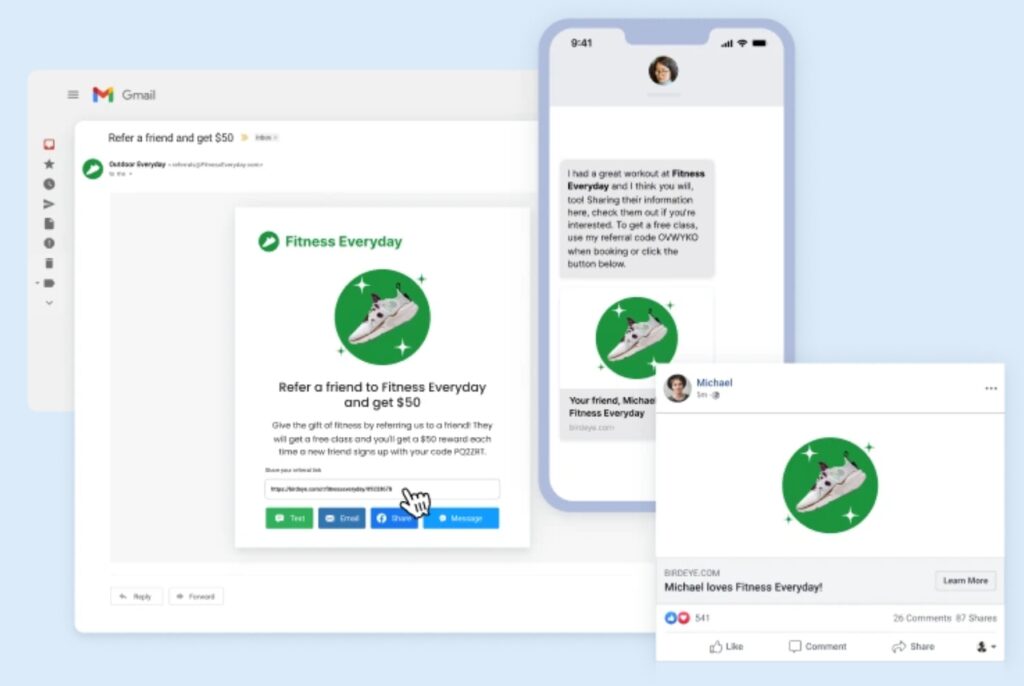
Sign 5. Referral leads are engaged and converted
Generating leads is only half the battle; the ultimate goal is converting them into loyal patients. An effective referral management system provides tools to nurture and engage referral leads through personalized communication, automated follow-ups, and targeted messaging. By maintaining consistent communication and delivering a superior experience, you increase the likelihood of converting referrals into long-term patients.
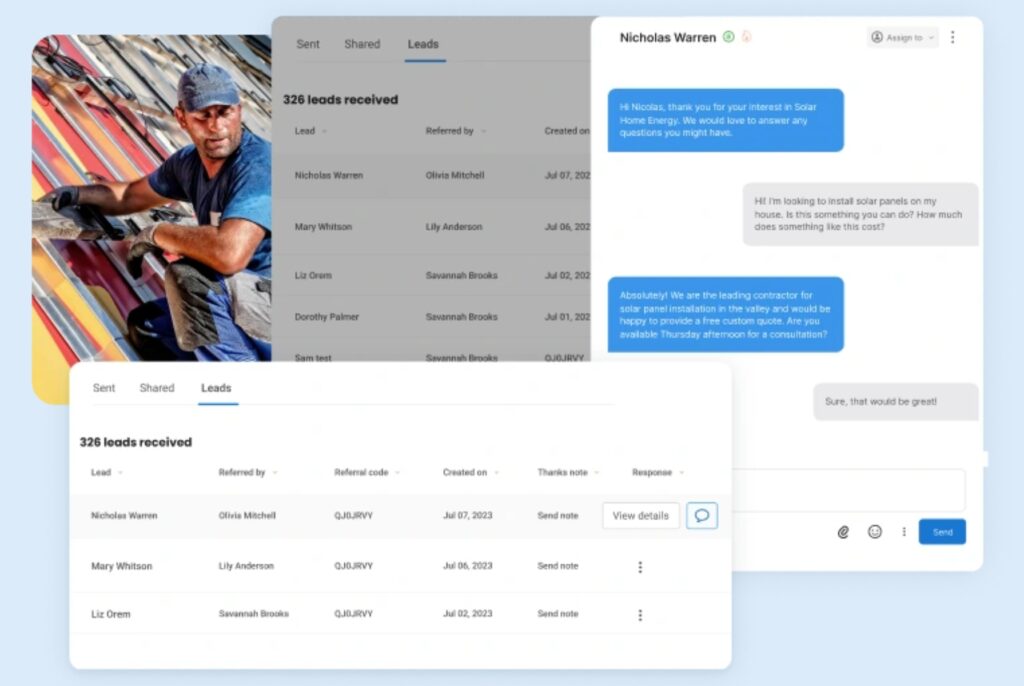
Sign 6. Referral success is measured accurately
Data-driven decision-making is crucial in any industry, and healthcare is no exception. An effective referral management system offers comprehensive analytics and reporting capabilities, allowing you to track your referral campaigns’ performance, identify improvement areas, and make informed decisions to optimize your strategies.
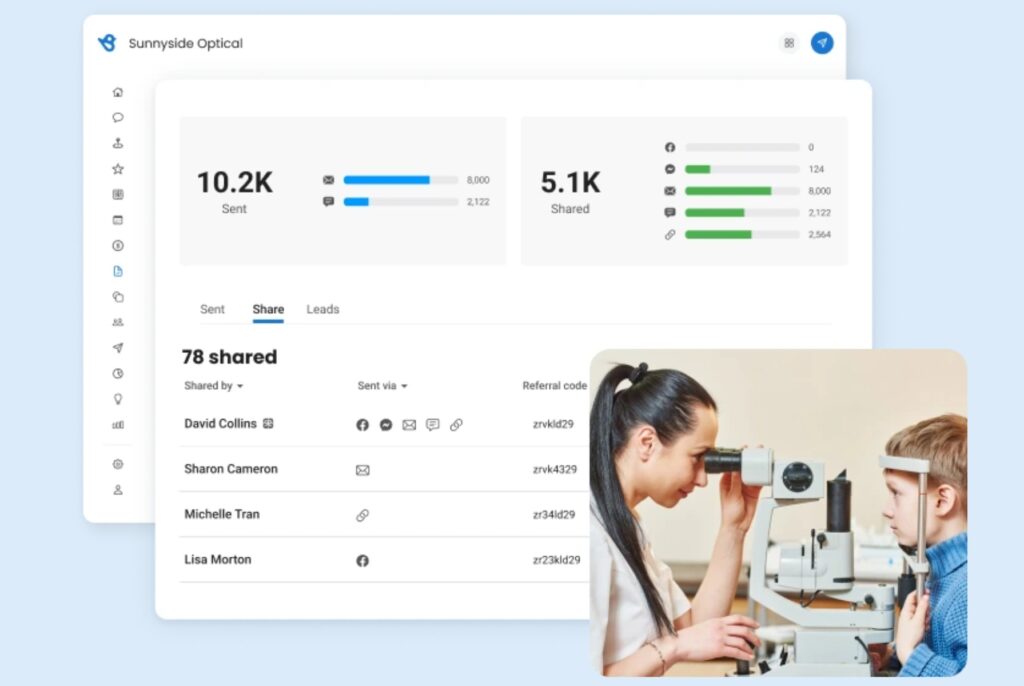
Sign 7. Seamless integration with your favorite apps
Integration is key to streamlining workflows and maximizing efficiency. An effective referral management system seamlessly works with the apps and tools you already use, such as patient management systems, marketing automation platforms, and other CRM integration software. This integration ensures a seamless data flow, eliminates manual data entry, reduces the risk of errors, and saves valuable time.
Pro-tip: By leveraging referral management software like Birdeye Referrals, which exhibits these seven signs, healthcare providers can effectively manage their referral processes, generate more qualified leads, and drive growth for their practices.
What are the key aspects of healthcare referral management
Effective healthcare referral management ensures that referrals don’t stop at “sent.” It focuses on what happens before, during, and after a referral so patients receive timely care and providers stay informed.
Here are the key aspects involved:
1. Referral initiation
Referral management begins when a provider identifies the need for additional care and initiates a referral. This step includes capturing the reason for the referral, relevant patient details, and ensuring the referral is assigned clear ownership from the start.
2. Information sharing
Accurate and timely exchange of clinical information is critical. Referral management ensures medical records, notes, and supporting documents are shared securely with the receiving provider, so care is not delayed or duplicated.
3. Coordination and scheduling
Once a referral is made, the next step is coordination. This includes scheduling appointments, confirming availability, and ensuring the patient knows what to expect next. Poor coordination is one of the most common causes of referral delays.
4. Referral tracking and follow-up
Tracking referral status is central to effective referral management. Teams need visibility into whether a referral is scheduled, completed, or stalled. Consistent follow-up helps prevent referrals from being missed or forgotten.
5. Patient communication
Patients should be kept informed throughout the referral process. Clear communication reduces confusion, improves trust, and minimizes unnecessary calls or drop-offs during care transitions.
Press Ganey’s 2025 Consumer Experience Report found that 72% of patients cite proactive communication about next steps as a primary driver of trust during care transitions.
6. Outcome confirmation and closure
Referral management doesn’t end with the appointment. Closing the loop by confirming outcomes, receiving updates from specialists, and documenting next steps ensures continuity of care and complete records.
Effective healthcare referral management can be achieved through various methods:
- Traditional methods: These involve paper forms, phone calls, faxing medical records, and manual tracking. While still used in some settings, they can be time-consuming, prone to errors, and lack transparency.
- Electronic health records (EHR): EHR systems can facilitate electronic referrals, streamlining the process and improving data accuracy.
- Healthcare referral management software: Dedicated software offers comprehensive functionalities, including automated workflows, secure communication tools, appointment scheduling, and performance tracking. This provides a centralized platform for managing referrals efficiently.
What is patient referral management software?
Patient referral management software is a specialized system designed to facilitate patient referrals between healthcare providers. It supports a more integrated health system, ensuring timely, efficient, patient-centered care.
This software is a key tool in the increasingly complex healthcare environment, where care coordination and information sharing among multiple providers are critical.
What are the benefits of adopting a healthcare referral management system
✅Improved patient outcomes: Efficient communication and coordinated care plans lead to better patient experiences and potentially better health outcomes.
✅Increased efficiency: Automated tasks and streamlined workflows free up valuable staff time for patient care.
✅Enhanced patient satisfaction: Transparency, timely communication, and a smoother referral process contribute to happier patients.
✅Practice growth: Effective referrals can lead to a wider patient base and practice growth.
What are the major differences between traditional and modern healthcare referral management software
Many healthcare organizations still rely on traditional referral methods such as phone calls, emails, paper forms, and spreadsheets. While these approaches can work at a small scale, they become difficult to manage as referral volumes increase.
Traditional methods often lack visibility. Teams have limited insight into referral status, follow-ups are manual, and information can be missed or delayed across systems. This makes it harder to track outcomes and maintain consistency.
According to the AMA’s 2025 Practice Efficiency Report, physicians and staff spend an average of 14 hours per week managing administrative tasks tied to care coordination and referrals, underscoring the inefficiencies of manual systems.
In contrast, healthcare referral management software centralizes referral workflows. Referrals can be created, tracked, and followed up on in one place, with clearer ownership and fewer manual steps. Automation helps reduce delays, while reporting provides visibility into referral performance.
As healthcare organizations grow, referral management software offers a more reliable and scalable way to manage referrals, improve coordination, and reduce administrative effort.
What are the benefits of having healthcare referral management software?
Choosing the right software can transform how you handle patient referrals. Here are a few key benefits a healthcare referral management software tool must offer:
#1: Boost efficiency & save time
- Automated tasks: Automating tedious tasks like generating referrals and tracking status frees up staff for more personalized patient interactions.
- Seamless EHR integration: Eliminate duplicate data entry and ensure patient information is readily available with effortless EHR integration.
- Intuitive interface: Easy-to-use software minimizes training time and simplifies referral management for your entire team.
#2: Improve communication & collaboration
- Secure online referrals: Ensure clear communication and eliminate lost paperwork with electronic referrals containing detailed information.
- Real-time updates: Keep everyone informed with automatic updates on referral status for you, patients, and specialists.
- Secure messaging: Streamline communication and eliminate the need for phone tag with secure messaging functionality within the platform.
#3: Data-driven decisions & continuous improvement
- Comprehensive reporting & analytics: Gain valuable insights into referral volume, wait times, and patient satisfaction metrics.
- Customization capabilities: Tailor the software to fit your specific workflow and referral needs for optimal performance.
- Advanced reporting tools: Identify areas for improvement and track the effectiveness of changes with customizable dashboards and drill-down capabilities.

#4: Empower your patients & enhance satisfaction
- Patient portal access: Empower patients with the convenience of submitting referrals online at their own pace.
- Real-time updates on referral status: Keep patients informed and foster trust with constant transparency throughout the referral process.
- Mobile accessibility: Improve patient experience by offering mobile app functionality for accessing referrals and communicating with your practice on the go.
These benefits highlight how effective healthcare referral management software can transform your practice by streamlining workflows, fostering strong communication, and ultimately improving patient satisfaction.
Why you should use Birdeye Referrals as your healthcare referral management software
Effective healthcare referral management doesn’t stop at coordination; it also plays a key role in practice growth. This is where Birdeye Referrals adds value.
Birdeye is trusted by the biggest brands globally, with integrations across 3,000+ CRMs and healthcare systems.
Birdeye Referrals helps healthcare organizations turn satisfied patients into active advocates through automated referral campaigns. Instead of relying on manual requests or informal word of mouth, teams can digitize referral programs, trigger referral requests at the right moments, and track results from a single platform.
With Birdeye Referrals, healthcare organizations can:
- Measure referral performance with clear dashboards and reports
- Run referral campaigns at scale using automated triggers
- Identify happy patients and invite them to refer at the right time
- Collect referrals across channels like text, email, and social
- Respond quickly to new referrals using a centralized inbox
Suggested read: Is your healthcare payment system up to par? Time to find out
What’s more, Birdeye Referrals prioritizes data security and fully complies with HIPAA guidelines, protecting sensitive patient information.
Birdeye goes beyond referrals. It offers a seamless online reputation management tool, allowing you to leverage positive online reviews to attract new patients organically.
Best practices to excel at referral management: 1. Simplify patient referral options with multiple channels (online, phone, in-person). 2. Briefly showcase the patient's situation and needs in the referral request. 3. Monitor referral status, ensure appointments, and gather patient feedback after visits.
FAQs on healthcare referral management
Effective referral management improves patient outcomes by ensuring timely access to specialist care and enhances coordination between healthcare providers.
Referral management software streamlines the referral process, reduces administrative burdens, ensures data accuracy, and improves communication between healthcare providers.
Look for features like real-time tracking, secure information exchange, integration with existing EHR systems, user-friendly interfaces, and comprehensive analytics.
Yes, referral management systems can significantly reduce healthcare costs by reducing duplicate testing, preventing care delays, and improving overall efficiency.
Quick and efficient referral processes lead to shorter wait times and better health outcomes, greatly enhancing patient satisfaction.
Referral management software typically integrates with EHRs and other healthcare systems to streamline data exchange and improve workflow efficiency without disrupting existing operations.
These systems standardize and automate the referral process, allowing a business to handle increased patient volumes efficiently supporting growth and scalability.
Yes, they facilitate better communication and coordination between different departments, which is crucial for multi-specialty practices and large healthcare facilities.
Patient-centered care starts with Birdeye’s healthcare referral management
With Birdeye Referrals, healthcare providers can ensure a consistent flow of new patients and achieve sustainable business growth.
Don’t miss out on this powerful tool—use our pricing calculator to get a customized view of how much you need to invest in Birdeye Referrals and see how it can elevate your healthcare referral management to new heights.

Originally published
